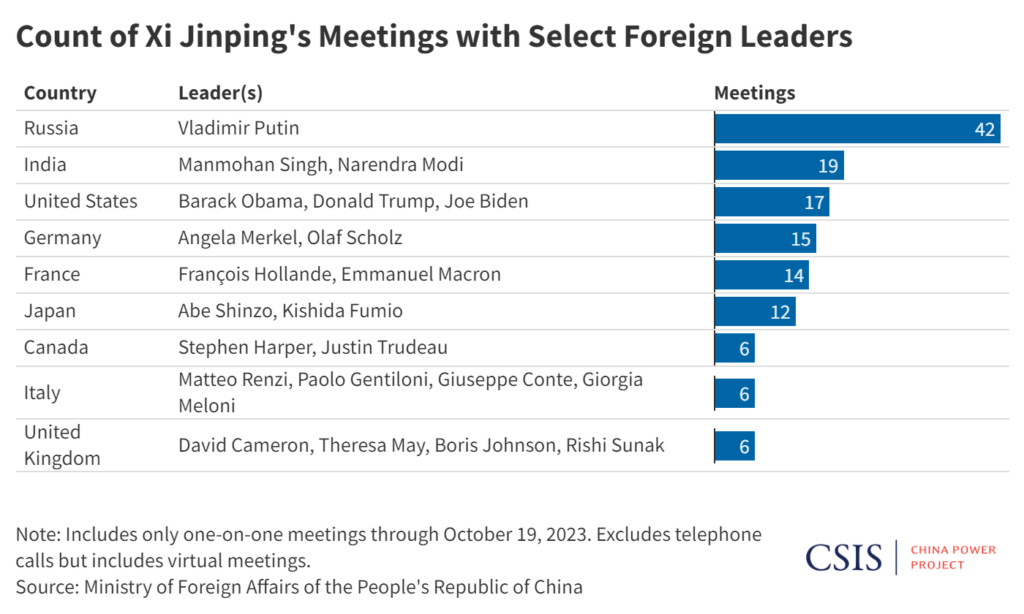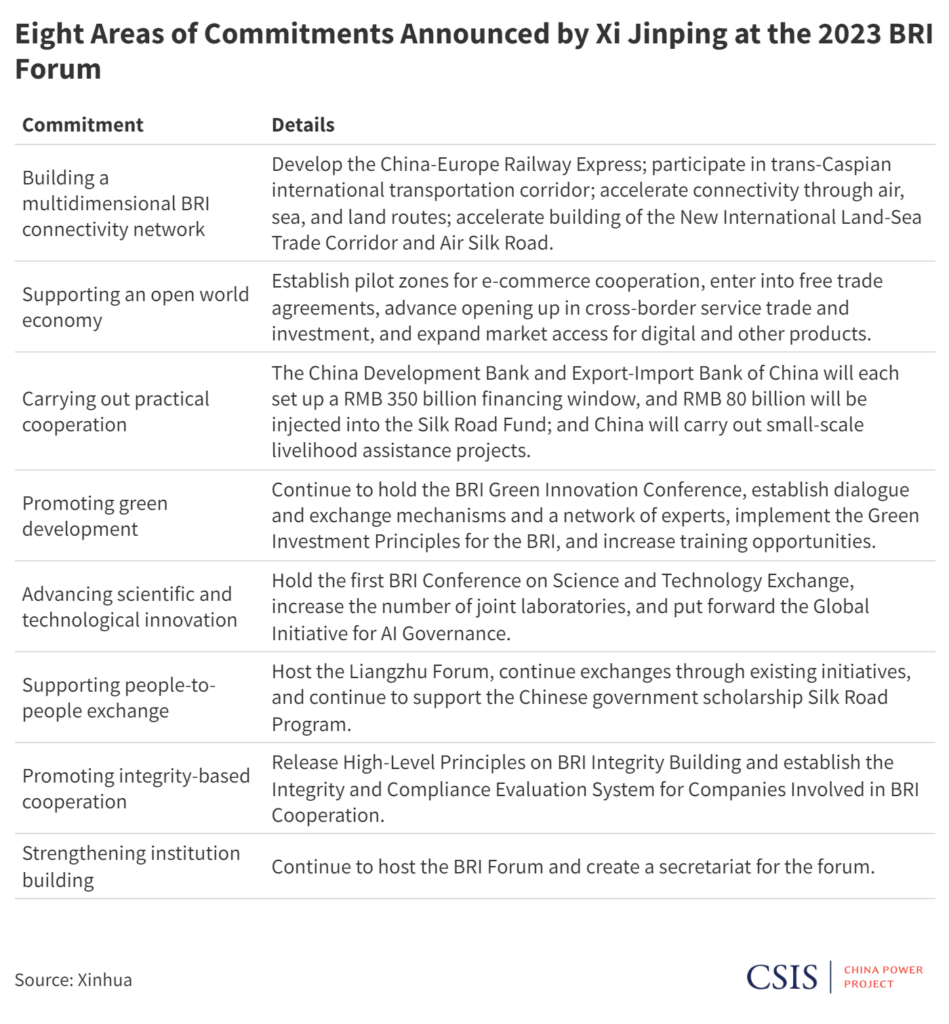By: Bonny Lin, Brian Hart, Samantha Lu, and Yu-Jie (Grace) Liao
October 24, 2023
From October 17–18, China hosted the Third Belt and Road Forum for International Cooperation to mark 10 years of the Belt and Road Initiative (BRI). While the forum itself was significant and warrants analyzing, one of the most noteworthy aspects of the forum was a meeting on the sidelines between Chinese president Xi Jinping and Russian president Vladimir Putin. This marks their first meeting since Xi’s trip to Moscow in March 2023, and it is Putin’s first trip to the People’s Republic of China (PRC) since Russia invaded Ukraine in February 2022. Together, the Xi-Putin meeting and the BRI forum provide valuable insights into China’s foreign policies.
What the Xi-Putin Meeting Reveals about China-Russia Relations
This latest meeting between Xi and Putin comes amid growing concerns among the United States and its allies about deepening strategic alignment between Beijing and Moscow. While China has not taken drastic steps to aid Russia’s war in Ukraine—such as providing Russia with lethal military aid—Beijing has gone to great lengths to prop up Russia diplomatically and economically. In September 2023, monthly trade between the two countries reached a record high of $21.2 billion, up nearly 60 percent from the same period two years earlier.
Xi and Putin have maintained a close relationship since Xi came to power in 2012. This latest meeting is their 42nd to date. In total, Xi has met with Putin more than twice as many times as any other world leader.
Beijing earmarked Putin for special treatment during the forum. In the official group photos of heads of state and government, Putin is always positioned beside Xi, and one video posted online shows Xi and Putin walking side by side, noticeably ahead of the other dignitaries. The official Chinese readout of the Xi-Putin meeting states that Xi “held talks” (会谈) with Putin. Chile’s Gabriel Boric and Indonesia’s Joko Widodo were the only others to receive that distinction; several other leaders were described as only “meeting” (会见) with Xi.

The readout of the Xi-Putin meeting was brief, but several aspects are worth noting. First, Xi doubled down on the importance of strengthening China-Russia relations. Xi stated that “developing the China-Russia comprehensive strategic partnership of coordination with ever-lasting good neighborliness and mutually beneficial cooperation is not an expediency, but a long-term commitment.” Xi’s emphasis on “long-term commitment” counters arguments that the China-Russia relationship is a marriage of convenience.
Notably, Xi did not use the term “new era” (新时代) when describing the China-Russia partnership, despite that phrase being officially stamped onto the moniker of the upgraded relationship in 2019. However, he did emphasize the need for both countries to grasp the trajectory of history, and Putin voiced his view that Xi was correct in his judgement that “the world is undergoing changes unseen in a century.”
Xi and Putin both mentioned that the two countries will mark 75 years of diplomatic relations in 2024 and advocated for advancing relations next year. A deepening or upgrading of China-Russia relations next year could strengthen Beijing’s position in a potentially difficult year. Beijing is worried about the larger geopolitical impacts of the two conflicts in Ukraine and the Middle East and is concerned that U.S.-China relations could deteriorate in 2024 because of dynamics associated with the U.S. and Taiwan presidential elections.
Second, Xi and Putin each offered support to the other for challenges they faced at home and abroad. Without directly addressing Russia’s war in Ukraine or the failed Wagner coup, the readout indicates Xi stated that “China supports [the] people of Russia in following their choice of path to national rejuvenation and in safeguarding sovereignty, security and development interests of the country.” Reciprocating PRC support for Russian rejuvenation, Putin reaffirmed Russia’s commitment to “one China” and Taiwan as part of China, and support for protecting China’s sovereignty and territorial integrity.
Finally, the readout shows that both leaders are committed to broader international cooperation. Xi discussed the recent historic expansion of the BRICS and expressed PRC support for Russia’s hosting of the BRICS leadership summit. He also made clear China’s desire to work with Russia within the United Nations, Shanghai Cooperation Organization (SCO), and G20 and to work together on food, energy, and supply chain security. Putin echoed Xi’s desire to cooperate within the BRICS and “other multilateral mechanisms,” but interestingly the readout did not indicate that he specifically spelled out cooperation in the United Nations, SCO, or G20. The two leaders also held an “in-depth exchange of views on the Palestinian-Israeli situation.”
In addition to the publicized bilateral meeting, which was attended by high-level officials on both sides, Putin revealed that he and Xi also had a private conversation over tea that lasted an “hour and a half, maybe two hours.” According to Putin, this private discussion was held at Xi’s suggestion, and the two had “very productive and informative” conversations on “very confidential” topics. Official Chinese media has not acknowledged this private session, and it is not included in the official readout of Xi and Putin’s meeting.
Unpacking the Belt and Road Forum
The Xi-Putin meeting took place on the sidelines of the third BRI forum. Launched in 2013, the BRI is Xi Jinping’s signature foreign policy initiative aimed at strengthening China’s connectivity with the world through hard and soft infrastructure development and people-to-people exchanges.
By some statistics, China could argue that the BRI has been a success. As of October 2023, 151 countries have signed onto the BRI. Together, those countries—which are overwhelmingly developing countries—have a combined population of some 5.1 billion people and a collective GDP of roughly $41 trillion. The willingness of these countries to join the BRI has been a source of pride and legitimacy for China on the world stage.
Yet the BRI has faced significant hurdles. The Covid-19 pandemic and China’s ongoing economic slowdown at home have had a dampening effect. In 2022, the combined value of Chinese overseas investment and construction projects in BRI countries was down over 44 percent from their high in 2018.
On top of this, BRI skepticism has grown as many BRI projects have faced implementation problems and as geopolitical tensions between Beijing and Western countries have heated up. In recent months, the administration of Prime Minister Giorgia Meloni has publicly floated its interest in withdrawing Italy from the BRI with the goal of retooling its economic relationship with Beijing to put Italy on a more equal footing.
Although most countries have not withdrawn from the BRI, there is dampened interest in the PRC-led effort and what benefits it can deliver. These dynamics were on display at this year’s BRI forum. Only 23 heads of state or government attended this year, down from 29 at the 2017 forum and 37 at the 2019 gathering. Top leaders from several South and Southeast Asian countries did not attend, including Brunei, Malaysia, Myanmar, Nepal, the Philippines, and Singapore—despite having attended the 2019 forum. Leaders from multiple Central Asian countries (Azerbaijan, Kyrgyzstan, and Tajikistan) skipped as well.
Many European leaders were likewise conspicuously absent. Hungarian president Viktor Orbán was the only leader from an EU state in attendance, whereas in 2019, top leaders from Austria, Cyprus, the Czech Republic, Greece, Italy, and Portugal (plus Belarus and Switzerland) were present.
Recognizing international criticism against the BRI, the week before the forum, China’s State Council released a white paper on the BRI, touting the initiative’s successes of the last decade. It specifically sought to counter widespread concerns about the accountability and transparency of BRI projects, emphasizing that the initiative is “committed to open, green and clean cooperation towards inclusive and sustainable development,” and adding that it has “zero tolerance for corruption.”
In contrast to the early years of the BRI, which focused heavily on large-scale megaprojects, the white paper put significant emphasis on digital connectivity, cooperation on science and technology, and shifting toward “green and low-carbon development.”
In his keynote speech at the forum, Xi Jinping announced eight broad areas of commitments that embody the shifting priorities foreshadowed in the white paper (see table below). This included commitments to deepening cooperation in green infrastructure, green energy, and green transportation. On the technology front, Xi committed China to promoting technology cooperation by increasing the number of joint laboratories built with other countries.
Xi’s speech includes a specific focus on artificial intelligence (AI) with the announcement that China will establish a Global Initiative for AI Governance. Setting the rules for use and development of AI has been a topic of discussion in high-level U.S.-China dialogues, and Xi’s new initiative seeks to ensure that China takes the lead in defining the new rules. China is casting its AI initiative as “inclusive” and based on “mutual respect, equality and mutual benefit,” but real questions remain, including whether this new initiative will suffer similar problems in implementation and whether PRC sharing of AI technologies will further empower PRC-friendly governments to increase surveillance and control of their citizens.

While Xi signaled new areas of focus for the BRI, it is clear Beijing intends to continue some of the key infrastructure connectivity projects. In his speech, Xi mentioned China would continue to develop the China-Europe Railway Express and participate in the trans-Caspian international transportation corridor. He also committed the China Development Bank and Export-Import Bank to setting up a RMB 350 billion financing window and said that China would contribute another RMB 80 billion to the Silk Road Fund.
More broadly, Xi’s speech sought to cast China as a global champion of internationalism and globalization in contrast to the United States and its partners. While not mentioning countries specifically, he indirectly criticized Western efforts to “de-risk” their economies from China, stating, “Viewing others’ development as a threat or taking economic interdependence as a risk will not make one’s own life better or speed up one’s development.”
This article was originally published as CSIS commentary here.

